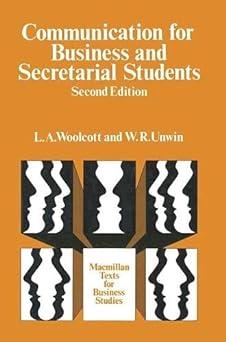Read carefully the following extracts from the Employer's Guide to Pay As You Earn, issued by the
Question:
Read carefully the following extracts from the Employer's Guide to Pay As You Earn, issued by the Board of Inland Revenue:
The Pay As You Earn method of deducting income tax from salaries and wages applies to all income from offices or employements (except in a few isolated types of case for which the employers concerned will be given special instructions). Thus Pay As You Earn applies not only to wages and salaries but also to annual payments, bonuses, commissions, directors' fees, pensions, and any other income or emoluments.
Under Pay As You Earn the amount of tax which the employer has to deduct depends on the employee's total gross pay since the beginning of the income tax year.
Where an employer has an arrangement under which meal vouchers are issued to his employees, the value of the vouchers issued to an employee is not regarded as part of his taxable income provided the following conditions are satisfied:
(1) the vouchers are non-transferable and used for meals only;
(2) where any restriction is placed on their issue to employees they are available to the lower paid staff;
(3) the value of the vouchers issued to an employee does not exceed 15p for each full working day.
Where condition (3) is not satisfied the value in excess of 15p a day is regarded as taxable income and is to be shown in a return at the end of the tax year.
(a) What difference is there between 'wages' and 'salaries'? Can you suggest any reasons why an employer or employee might have a preference for using one of these terms instead of the other?
(b) What do you understand by 'offices'?
(c) What, broadly speaking, is the difference between 'bonus' and 'commission'?
(d) A company decides to issue meal vouchers to its senior staff only.
Comment on the tax position.
Step by Step Answer:

Communication For Business And Secretarial Students
ISBN: 9780333148679
2nd Edition
Authors: Lysbeth A Woolcott






